How to Build a Real Estate Website in 2026: Full Guide

The real estate website development is centred around the creation of a strong online presence that allows businesses to win more customers and expand their offers. Moreover, it will enable them to gain more trust and a competitive advantage in the crowded market. With our guide, you will learn all the nitty-gritty details, from cost to features and the step-by-step property site building process.
Business owners can be confused about website development for real estate, as it involves many tech nuances required to build a reliable platform. You will unravel a well-worn tapestry of generating leads with a hub that fulfils the needs of your buyers and makes them want to but from you again and again.
If you are ready to investigate the topic and create a real estate website for a tailored purpose, keep reading to adopt our 10+ years of experience in developing solutions for the real estate industry. Let’s explore the intricacies.
What is real estate website development?
Answering from the perspective of coders who dedicated over a decade to this niche, we have a simple answer — our today’s topic stands for the building sites for real estate companies seeking new opportunities to grow their businesses.
The proven statement of “If you are not online, then you do not exist” is essential for them, and understanding that website creation is the VIP pass to cut-throat and profitable industry of selling/renting/buying properties they turn to this area, trying to define how to build a real estate website to address end-users’ demands and remain competitive.
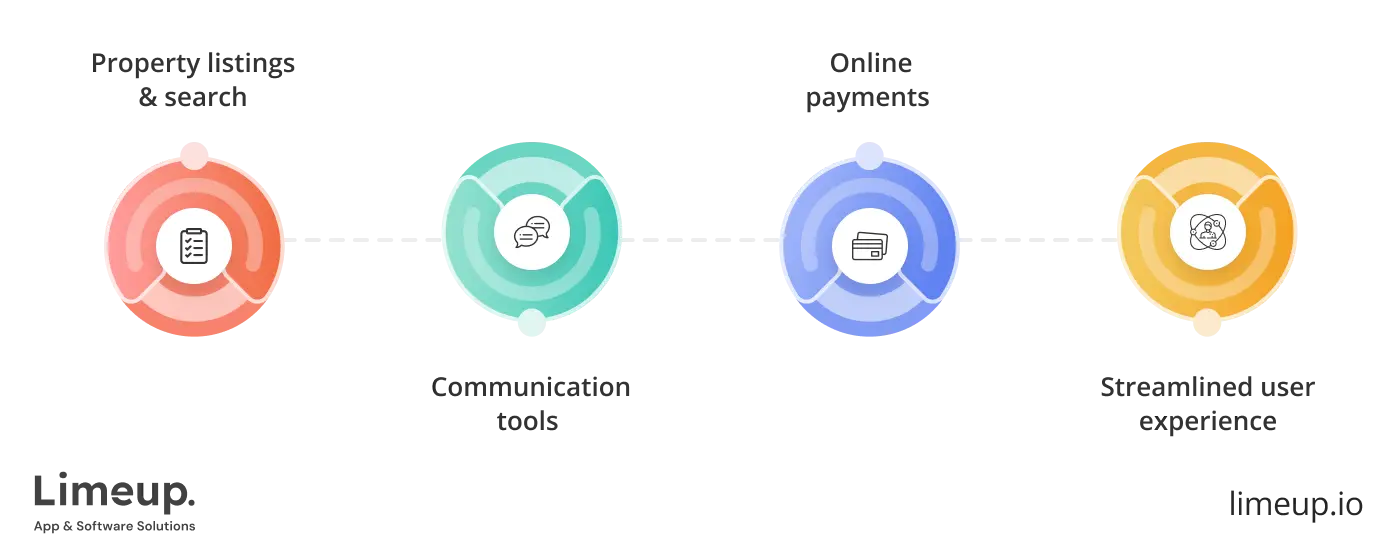
We can also say that this process is about writing code lines and designing elements that will work like a well-oiled machine, helping you to reach your objectives, from streamlining sales to interactions with brokers, buyers, and other clients.
Why is it crucial? — All because of digitalization that has turned the most stable industries like real estate on its head, and in-person meetings, manual paperwork is no longer an option for people who would like to save their time and money, making fewer interactions and receiving desired results.
How do landholdings work in this case? — Renters, investors or other interested parties land on your website, review properties available, choose online, make conversations through chats or calls, sign contracts, pay with Stripe, PayPal or another service, and that’s it.
Real estate web development is about convenience which can be reached when back-end and front-end, integrations, user experience and design are aligned with goals that are planned to be achieved.
Types of property websites
Depending on your specification, you are able to receive a wide range of sites with the set of custom features, so if you are thinking, “Well, you can only build some booking solution, and that’s all,” here are the categories available for you:
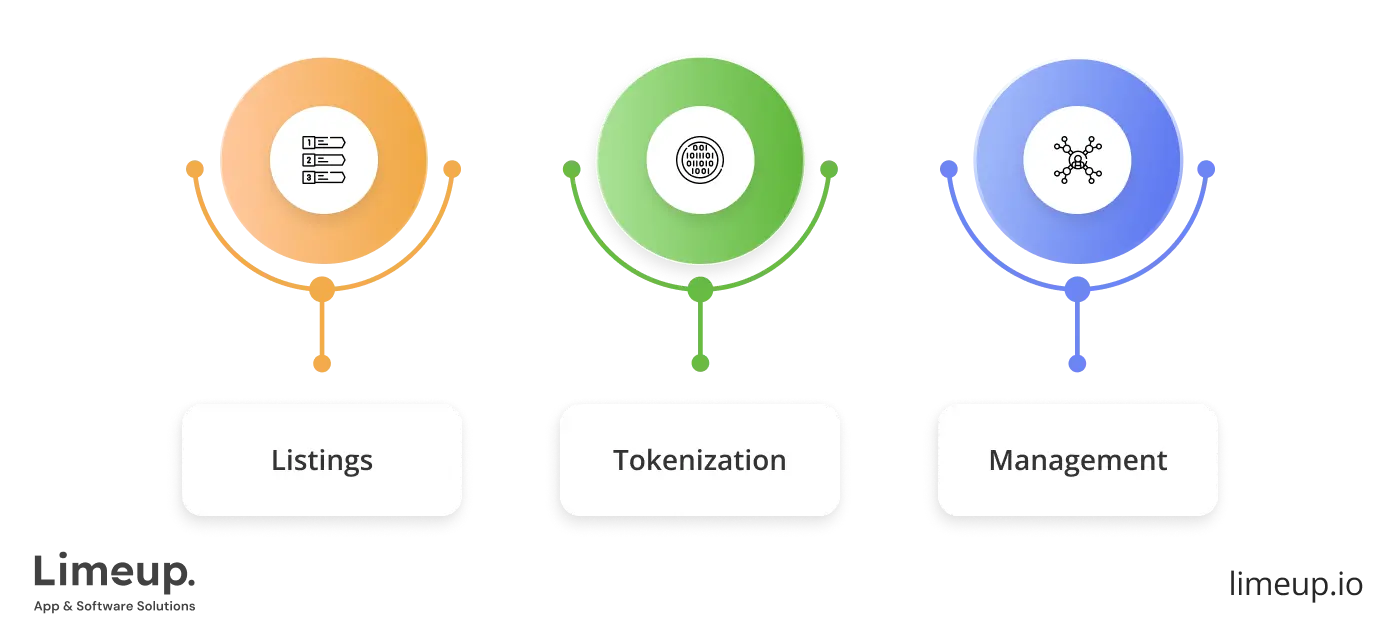
-
Listings like Zillow or Booking.com are the most common ones, used for users who would like to rent or buy properties using a comprehensive and visually appealing marketplace. Talking about specifications, the target audience is expanded to home buyers, landlords with houses and apartments, investors.
Using them, seekers are capable of benefiting from advanced functions like filters and personalized recommendations, calculators, pet-friendly places, and so on.
-
Tokenization platforms are cutting-edge ones, created with the use of blockchain by real estate website developers who are proficient in this technology. This one is typically used by investors who are seeking an opportunity to invest in this area, buy digital real estate assets, and receive income.
Considering this kind of site, we would like to note that it is not the most common one but a specialized one, enabling investments through blockchain (tokens).
- Management is one of the types we have been delivering for over 10 years now, and based on our experience, it’s a must-have for businesses that need to store in one place rent collections, maintenance of properties (mainly requests from renters if something is broken), and other day-to-day operations.
We have named the three kinds you can meet in services searching for this topic, yet, owing to customization, you can create a solution that 100% meets your needs if off-the-shelf solutions are not suitable. Moreover, you will be able to decide on interface, functionality, mobile accessibility, browser compatibility, design elements, and more (it is a little spoiler).
As a custom real estate software development company, we put our experience in this material to make it a helpful guide, and not an informational hub. Therefore, let’s review the concrete stages of building a platform for this niche.
How to create a real estate website in 4 steps?
Our experts decided it is essential for you to have an ace up your sleeve, so here we go with a 4-phase guide that will help you to start the creation of your site in short term. The process is not that easy and has some tech-challenging moments, therefore, we will discuss them to prevent any confusion.

— Step 1. Establish your vision.
Keep in mind that people come for your service, but firstly, they come for your brand, your positioning, story; they want to see which problems you can solve, what pain points to can cover. It is advisable to start with doing your homework and answering vital questions we use when briefing our potential clients:
- Who is your target audience?
- What type of site do you require?
- What is your unique proposition?
Starting small, you are able to move on and define your business goals, what features you need, what your design will look like, what number of pages you need (for example, FAQ is not a vital point while CTA form is the whole point).
— Step 2. Code and create UI/UX design.
If you choose to develop a real estate website unaccompanied, you need to set an environment and install tools needed to edit the code lines, control versions, and more. You also need to be proficient in programming languages like JavaScript, but we will consider the technology stack further in this article.
Another available option is to entrust the development process in the hands of reliable programmers who have experience of crafting similar projects. Also, planning to expand your website to an application for wider access, you can collaborate with a real estate mobile app development company and gain more online recognition.
The user experience part is about how customers perceive your site, and you have less than 5 seconds to impress them, or they will choose your competitor. That is why while working on UI/UX design mind yourself it will be clients’ first impression of you, as well as the statistics indicate that 43% of participants looked for property online at first.
— Step 3. Conduct quality assurance.
The previous stage is a large one as web development for real estate takes thousands of code lines, and you need to check each of them, as well as consider manual and automated testing of:
- functionality and core elements like links, buttons, CTA forms, navigation,
- cross-browser access at least through the top 3, Chrome, Safari, Edge,
- responsiveness for mobile and tablet devices with different screen sizes,
- performance to ensure pages download immediately,
- security, as you may store personal information and transaction data, and so on.
To put it simply, test everything you can reach out to, and ensure the final site performs according to your plan.
— Step 4. Deploy and optimize (constantly).
Here, you will move the site to hosting, publish it, and enjoy the result. Well, more like you will be maintaining it to ensure every part runs flawlessly, and it remains protected. It may seem like real estate web application development never ends, but in fact you can delegate the ongoing support and focus on urgent business problems that you can solve.
Summing up, it’s preferable to plan out every crucial aspect and be sure you have a well-structured system with pre-defined nuances about features to be developed, fonts to be chosen, brand colours, and other moments we have mentioned.
If you are thinking about how to create a solution with minimum effort and guaranteed results, you may cooperate with a vendor in the real estate niche, as they will take on every phase we described above, and you will only enjoy the results.
How long does website development for real estate take?
As sometimes the creation process may feel like herding cats, our experts decided it’s vital to place the timeline topic in this guide, providing you with comprehensive information about what affects the final terms and what time is exactly needed to build a reliable site.
To put it short, you need from 2 days to 2 years and you may say, “Well, it is not that helpful, you know?”. We are aware of this moment, as well as of the fact that there is no off-the-shelf resolution for every property business.
Yes, you can create a new document and code a few lines with head “Property Listing” and body element “Buy from us”, save it as HTML, and the website is ready to be published (if you have a domain). Still, it may not meet your global business objectives and barely attract any leads.
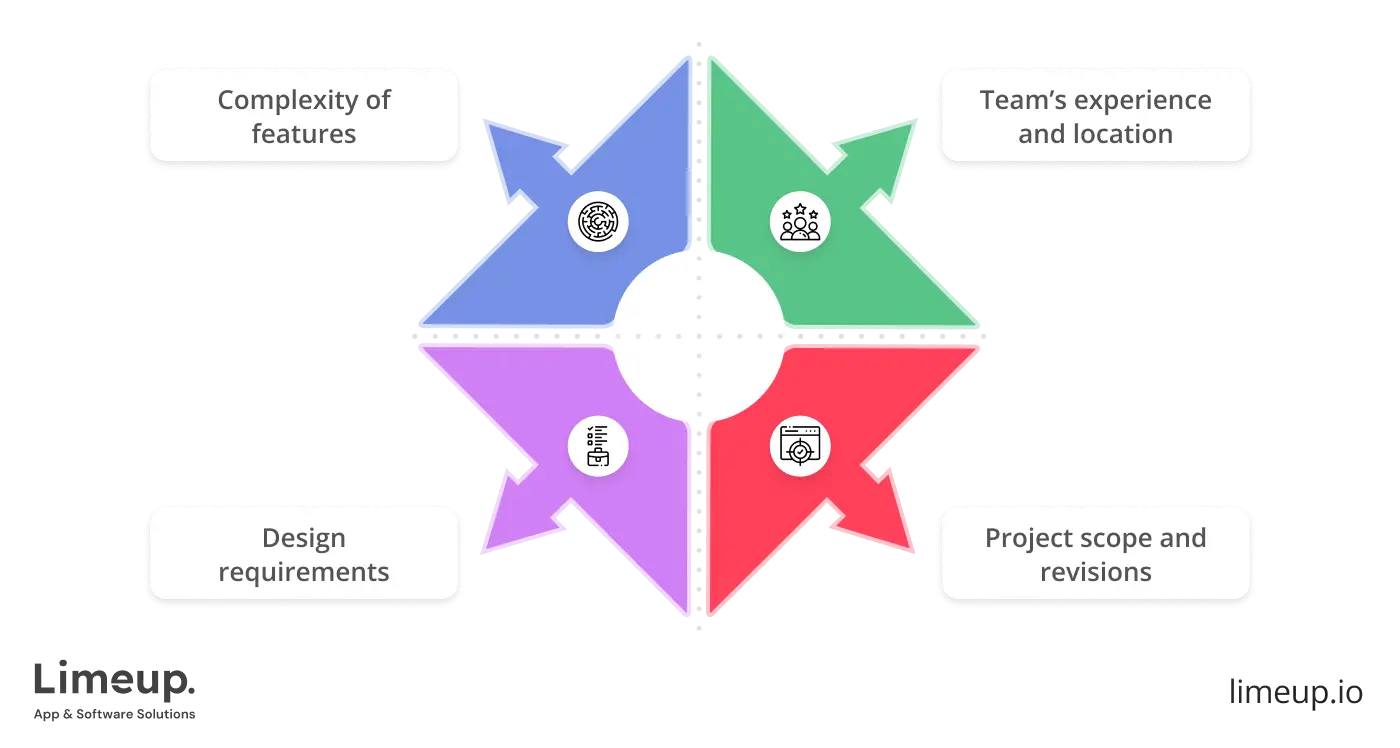
Then, what influences the timeframes for real estate website development? It is all about your level of complexity, features, design, tech stack, and experience. For instance, in some cases, you may find that working with a software agency in the UK or from another location will be like finding a well-marked trail in the wilderness.
Let’s reveal all the crucial moments affecting the timeline for crafting your site based on our experience of working with related projects:
| Stage | Timeline | Description |
| Defining requirements | up to 2 weeks | If you are about to create a listing type, you can set your needs in a few days while more complex platforms with advanced filters, integrations and cutting-edge technologies like VR will take more time. |
| Building and designing | up to 15 weeks | Officially the most time-consuming phase in property website development, and above we have considered it in detail, but simply the more pages you need, the more you will code and design. |
| Testing | up to 2 weeks | Ensuring your solution is bug-free is critical, and you need to dedicate a week or two to check every line of code you or your developer wrote. |
| Launching | up to a few days | As you are ready to go live, you will conduct some interactions, add and fine-tune Google Analytics, SEO tools, and so on. |
| Ongoing maintenance | endless | You will support your site for as long as it works, updating, upgrading, checking performance, and more. |
Summing up, if you are up for a basic solution, you will need a timeframe of up to a month for a basic one, while moderate-level products require up to 8 months, and fully customized, complex ones can take a few years.
What are the key features of real estate web development?
Your core goal is to fulfil the needs of your customers and engage them to keep browsing, come back for your offers, use CTAs forms, and literally interact with your website. It can be accomplished when you set up in-demand functionality that resonates with needs you have to cover.
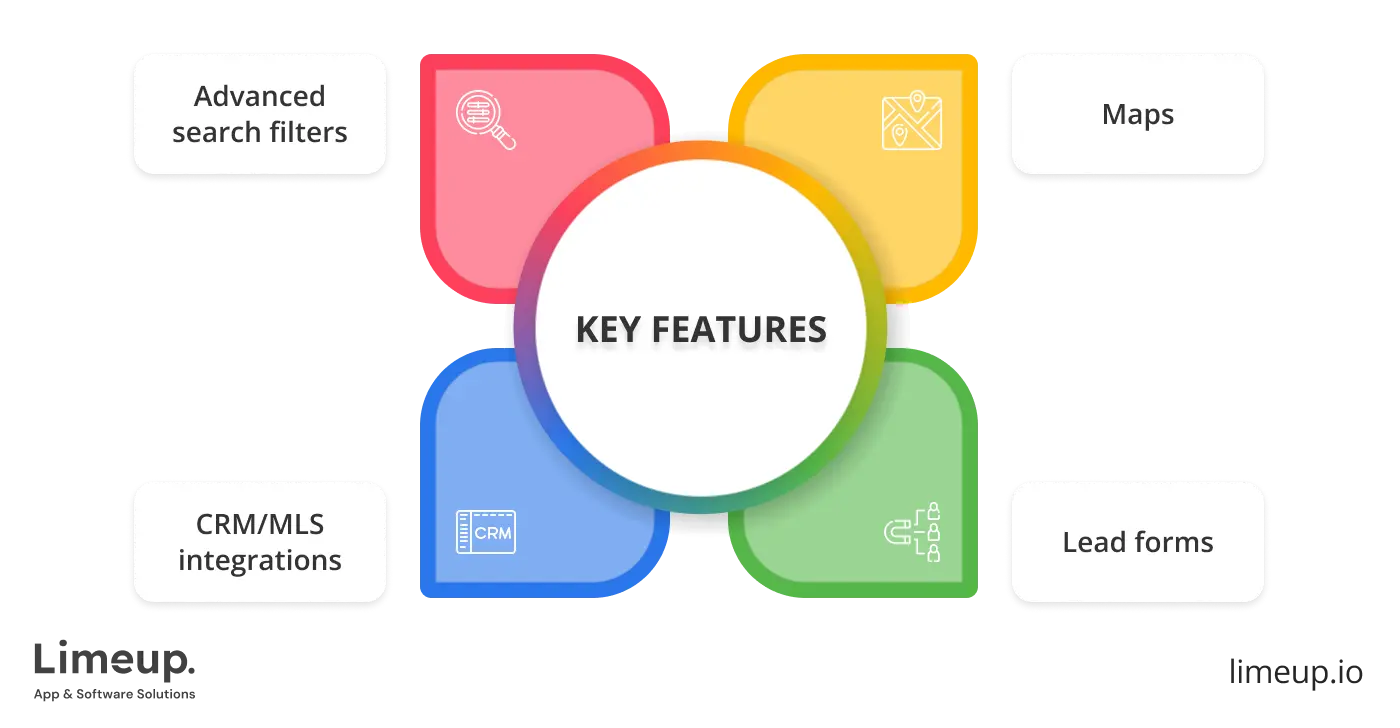
Here, we will review the core 5 ones, common for every type of site you can choose, and further you will decide on when contacting a web developer for hire or do it on your own.
-
Advanced search filters are more than just the ability to choose location and price range as it has to be tailored to your audience preferences: for instance, your clients are looking for apartment with easy commuting to their office or school for their kids, and you can add criteria telling them about the infrastructure (subway, buses, trams, else).
From our experience, one of the businesses aimed at helping new parents to buy properties, and one of the crucial filters they needed was the availability of walkable sidewalks for baby carriages.
-
Maps can be a function in terms of real estate web development services with the highest level of interactions through integrations of third-party apps. The main reason why customers need such a feature is the ability to check what is located nearby easily. Moreover, they can zoom in, zoom out, check other houses, draw, and more.
Among the most popular maps are Google Maps, OpenStreetMap, and Apple Maps. Within some advanced websites, visitors can click on a map, check a 360 view, and walk on the streets.
-
Lead forms are about actions you would like your users to take: they put numbers, emails, names, and other contact information so that you can add them to the list of potential clients (database) and turn them into your consumers.
You are able to choose amidst various kinds of CTAs: contact us, schedule a review, sign up for new posts, download PDF file with naming, everything that will work out for your end-users.
-
CRM/MLS integrations stand for Customer Relationship Management and Multiple Listing Service systems that can be added when you build a real estate website. Here, with MLS you receive the beneficial moment that allows you to automatically update the information on site, like price changes, available/sold status, and others.
CRM is more about lead generation when you don’t need to put manual efforts to capture leads and manage follow-up emails and chats through messengers.
With these fundamental functions and additional ones you will decide on when defining your requirements, you will craft a site that reflects your brand and meets end-users’ needs.
What tech stack is used for building a real estate website?
You have to be proficient in back-end and front-end technologies to create a robust site that will meet your needs, moreover, you may require some additional knowledge depending on the complexity of your project, and unique demands. For instance, you can cooperate with SaaS development companies that can leverage your scalability.

Let’s review the required and common programming languages and other tools:
Back-end:
Node.js is a premier choice for those coders who want to build robust and rich-in-feature solutions in terms of property website development, and, as it is said on the official website, this environment is able to “handle thousands of concurrent connections with a single server.”
Django is a framework based on Python, proven to be a safe and protected runtime that can take the weight off developers’ shoulders and speed up the creation process, handle all challenges. Scalability and maintainability are also core values of Django, making it so popular amidst coders who build comprehensive websites.
Laravel is used to create a real estate website as a PHP framework that has an easy syntax and can be learned faster, simultaneously providing beneficial moments like higher maintainability.
Front-end:
React enables quick start with web interfaces, having a markup syntax JSX with easy-to-understand logic. Moreover, as it says on the official website, with React, developers can “stay true to the web” and be highly responsive through browsers like Chrome, Safari, Mozilla Firefox.
Vue.js is a component-based framework used for efficient interface creation as a progressive type, enhancing HTML and adapting to your requirements.
CMS:
WordPress + IDX plugins are a combo in real estate website development services for coders who would like to learn how to make sites faster and with minimum resources, especially if they are about landing pages or websites with few pages.
Hosting/CDN:
AWS is a cloud solution with wide support and immersive capabilities for scalability as you go beyond traditional hosting and is able to make it in the cloud, with less work and a monthly subscription.
Wrapping up, a real estate web development company typically provides a range of offers that cover essential tools and programming languages for your product, and you do not have to deal with the tech part at all.
How much do real estate website development services cost?
There is no one-size-fits-all budget as your requirements differ, and we will consider these options below. Yet, we can not leave you without answers to this vital and tricky question. Let’s estimate them within a table:
| Type | Cost | Description |
| Basic | $5,0000–$8,000 | It is all about limited features and design elements, a simple contact form and admin panel. |
| Standard | $8,000–$12,000 | Here, you receive a site with advanced filters for properties, images, blog (optional), maps integrations. |
| Advanced | $12,000–$25,000 | Custom integrations of CRM and CMS, profiles, smart notifications. |
| Marketplace | $24,000–$55,000 | Custom portal, dashboard, payment integrations, built-in chats, chat bots, and more. |
Hourly rate for a real estate website developer
The price will depend on the experience and what coders can bring to your business, yet it is possible to write a symphony with spare change. Here is a comparison table for more details:
| Level | $ | Explanation |
| Junior | $20–$40 | They are capable of crafting a basic site using a few frameworks and core technology. Typically have limited portfolios. |
| Middle | $40–80 | They have strong skills and can take on challenging project based on their 3-5 years of background. |
| Senior | $80+ | They have niche competence and over 5 years on the real estate market. |
The choice depends on the level of complexity of your product, and you can select the beginner if your site is just a langing pade, while more customizable ones require a team of skilled experts.
Key factors that affect the cost
These standpoints we will name are the keystones in the arch of real estate web application development services and budgets you need for your product. For instance, you can hire Java programmers, and if it seems like an option to you, check our material to review hiring platforms and hourly rates for them.
As for the influences on the final price, you need to be aware of:
- features’ complexity,
- programmers’ proficiency,
- tech stack,
- hosting,
- ongoing support,
- team’s location, and so on.
It is advisable to investigate all the nuances about your product demands and how they impact the final cost, and one way of accomplishing this is to contact a vendor who can calculate it for you, offer reliable propositions. Stay tuned, and we will consider how to choose a top-tier provider.
How to select a partner for web development for real estate?
The collaboration with a tech partner can be blooming in the cracks of concrete especially according to the need of going beyond general web creation and unique requirements for features (we have considered them above) and user experience design. Let’s skip the talking and dive deeper into details:
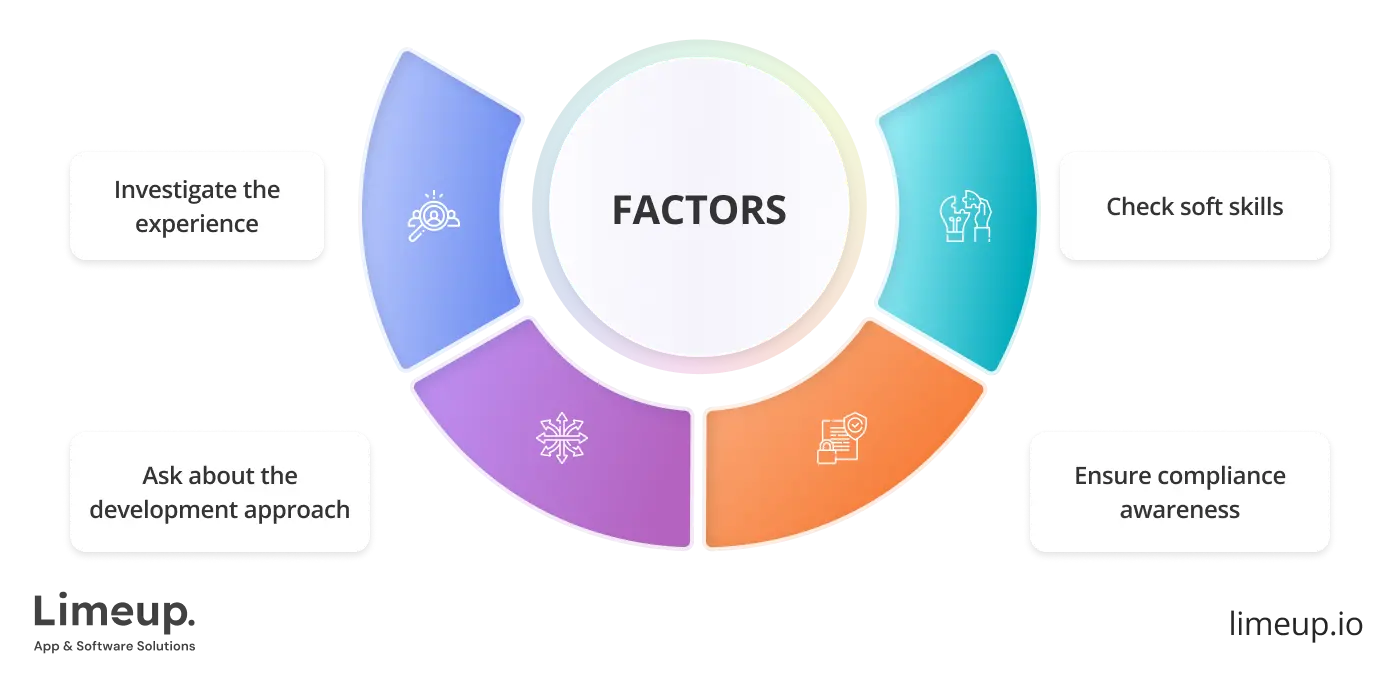
— Investigate the experience and proficiency.
Depending on your demands and specifications of property selling niche, you need more than just a standard crafting but a coder (or a team of programmers) who is aware of custom implementation for real estate web development, for instance, how to create virtual tours, how to target your solution, and more.
— Ask about their development approach.
Mobile-first strategy is a crucial point, more like a must-have as National Association of REALTORS indicates that 73% of buyers used smartphones or tablets to access sources with property listed. It is also about the fact that Google appreciates such sites that allow users to scroll through their mobile devices.
— Ensure they are aware of compliance.
It is advisable to prepare a checklist of regulations you have to follow, and you can find it online or write it down according to what you have learned from your experience. 100% that you will need unique real estate-oriented compliances according to your locations and specifications of the business.
— Check soft skills.
A man can not live by bread alone, as well as technologies without the ability to communicate well will probably break the project. How does it work? You are teaming up with a web coder and a real estate web designer to create a solution that may take a lot of time and teamwork, so it is preferable to ensure that the provider is capable of:
- explaining complex tech concepts if you are not familiar with coding,
- receiving feedback from you and adjusting the resolution to your vision,
- keeping you updated through the process with pre-defined KPIs, and more.
What trends are shaping property website development in 2026?
Tendencies may seem to be a nice-to-have option for real estate agency website development solutions but they cover a lot of nitty-gritty nuances that impact the business’s online presence and its ability to gain more revenue in the future.
Cut-throat industries like real estate force companies to remain competitive through the adoption of emerging trends, and it is now just a whim as the market share grows daily, with predictions to reach a CAGR of 5.5% by 2034.
Here, you will learn the core tendencies to be followed, which can enhance your results, whether you would like to get more revenue, reach new audiences, or otherwise.
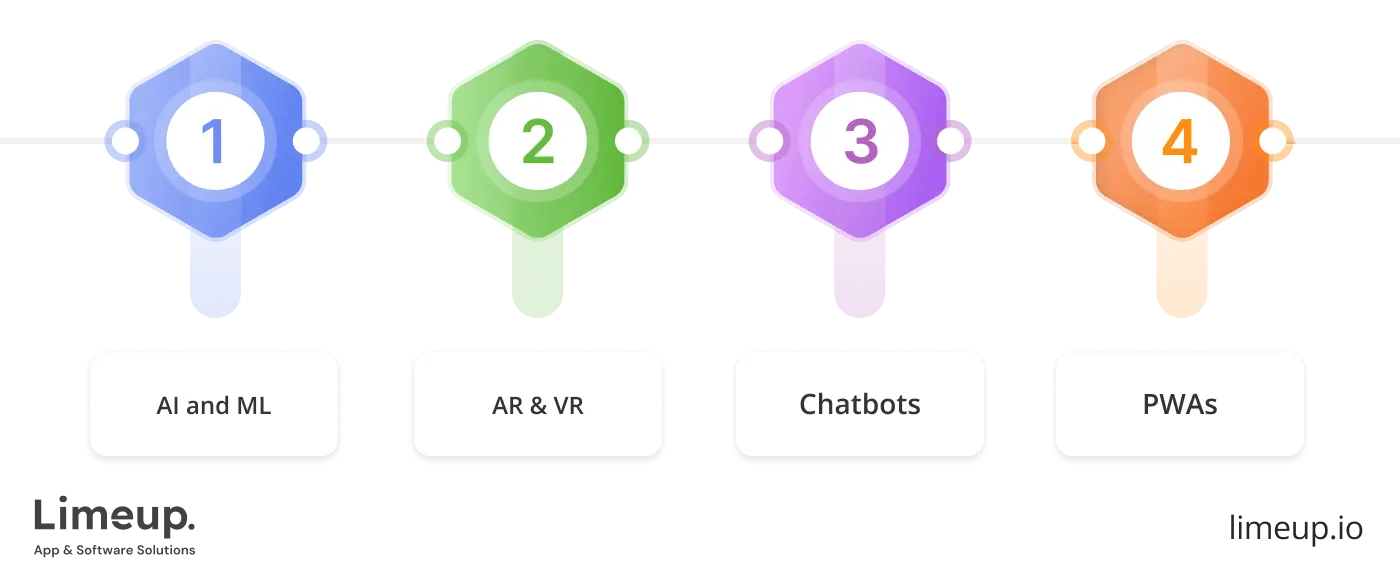
-
Artificial intelligence and machine learning for better personalization can bring more satisfaction for your customers, and the reason is understandable, as many people trying to search for property say they are tired of receiving offers that don’t match their expectations.
In other words, AIs are able to handle advanced analytics and provide target listings based on clients’ preferences, saving their time. It can be accomplished through the filters on your website, such as home type, status, year built, square feet, ownership, features, and more.
-
AR (Augmented Reality) and VR (Virtual Reality) are also cutting-edge technologies that are not yet that common for website development services for a real estate agency, and can be offered by seasoned teams. Images are not the modern way to present luxury property, while a 3D virtual tour will make an impression.
This point is a bit challenging from the tech side, and you need to find experts who have knowledge of the WebXR API and some frameworks so that your customers can use it within their browser, without the need to download applications. You also have to consider an additional level of security for this technology.
-
Chatbots empowered by AI-driven movers are aimed at better and faster communication, especially if you prefer to work globally and need to support consumers from different countries and time zones, speaking hundreds of languages. It is not always an option for small businesses to run a support team with native speakers who can work around the clock.
Moreover, you can implement them to drive more sales, as your worker puts the request, for example, update the database of properties, and they do it, saving your department’s time.
Cooperating with a real estate website development company that has reliable experience, you will also receive an opportunity to increase the number of leads. How? — browsing online, you definitely notice online chats where the expert is ready to answer your questions, and they have targeted phrases according to the page you are reading.
-
PWAs instead of mobile applications for clients who do not want to download additional software, for instance, because they can not access more phone memory. Still, it provides notifications and has the same features, increasing your chances of reaching out to a wider audience.
Note: You can shape trends and implement to your real estate agency website development solutions only those that will definitely work for you. The top-tier approach is to do research to define what your competitors choose to use, and what will be suitable for your end-users.
Why choose Limeup to build your property web solution?
If you are ready to get a golden ticket into the real estate niche and cooperate with a reliable tech provider, we at Limeup are ready to help. Based on our decades of experience, our customers approached us with a request to build a site that will satisfy various business objectives.
Whether you would like to receive a listing platform, marketplace, corporate website, or otherwise, our developers and designers will offer a comprehensive service according to your requirements.
Ready to discuss your project? Schedule a free call, and we will reach out to you within a business day. We will decide on time and date, and discuss your needs in terms of the project to offer the best-in-class way to solve your challenges.

